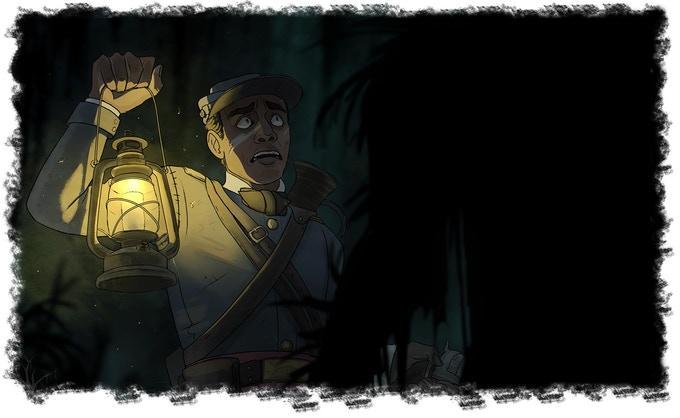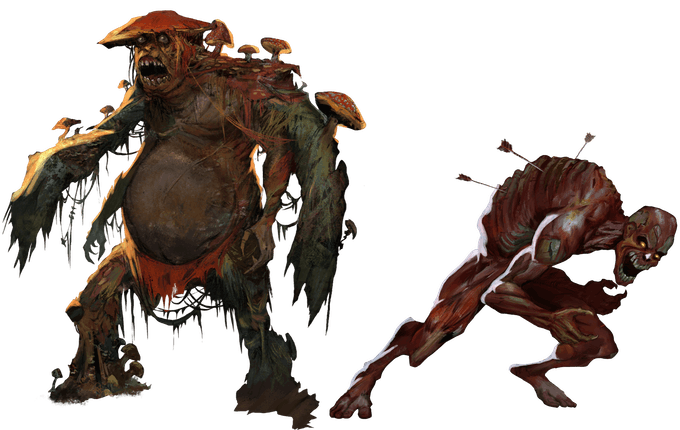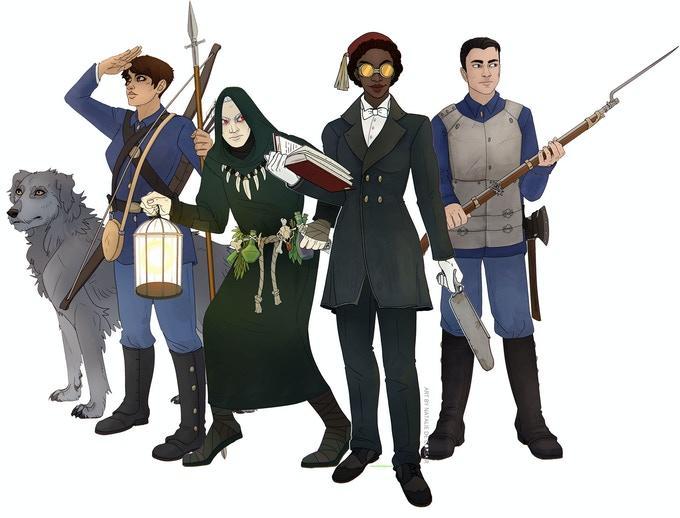Backwater is a southern-gothic horror tabletop roleplaying game in the style of survival horror. Its Kickstarter campaign launches on January 25th, 2021 at 8:00 PM CST. In Backwater, you play as a warden—a roaming peacekeeper—in the post-apocalyptic South. You’re tasked with keeping order at civilization’s southern reach: Backwater ward, a post-apocalyptic region that spans the Old World’s Louisiana, Mississippi, and southern Arkansas. Your job is to wander among the bogs, quell conflicts between towns and families, and keep monsters at bay.
A warden encountering a swampfiend at dusk. Art by Natalie de Corsair
The game’s southern gothic genre places characters in a southern U.S. setting, where the decaying structures and deteriorating aristocratic families reflect society’s superficial values and moral degradation. Outside civilization, monstrosities—abnormally large and aggressive beasts—roam, and mysterious monsters haunt Backwater, including conventional creatures of gothic horror as well as original creatures, like Gores, skinless humanoids who hunt unsuspecting travelers at night, and Hollow Men, slow-moving humanoids covered in in fungal growths who travel in hordes.
A hungry Hollow (left) and a wounded Gore (right). Art by LA Draws.
The game system is original, and it was designed for streamlined D20 rolls, flexible yet thorough character creation, and an abundance of skills that they can use. Characters are not nearly so invincible as they are in fantasy games, and they’re not so limited as in cosmic horror. Players can choose between four types of wardens: Savants (the brains and the faces), Seekers (the explorers and thieves), Seers (the psychics and magic users), and Slayers (the ranged and melee fighters). Their wardens quickly become more proficient in skills every time they level, and they gain new abilities every four levels. Characters can also advance by completing “achievements,” minor bonuses that they gain by accomplishing specific tasks during gameplay.
Left to Right: A Seeker and her wolfhound companion, a Seer and his whisper lantern, a Savant with a book and a bonesaw, and a Slayer with a bayonet. Art by Natalie de Corsair
Pledges are rewarded with the core rulebook (interactive, hosted eBook) and early access to the Systems Reference Document (SRD). Backers can also purchase add-ons, which include the hardcover core rulebook and the Backwater Adventures modules, among other enticing items.
Links:
-=-=-=-
The following paragraphs are taken from the campaign page:
A Statement on Race and Racism
We plan to use Kickstarter funding to commission sensitivity readers to edit for racist and ableist content. Much southern gothic fiction has confronted the South’s ugly history of racism. It has sought to undermine idealized, antebellum values relating to slavery, reflecting society’s moral decay in crumbling buildings and conflict-filled families. It’s a pointed focus of more recent works within the genre, as some early literature reinforced racism in the process of confronting it. Racism is not a theme in Backwater. Backwater seeks a careful balance: to establish a setting in which everyone can comfortably roleplay, without erasing or ignoring centuries of oppression.
The American Lands emerged from the apocalypse just as racially and ethnically diverse, by modern day’s standards, especially in New Orleans where many residents descend from African American and/or Haitian, German, French, or Spanish, Vietnamese, and Native American ancestry. Many stereotypes and inequities built around skin color and regional ancestry faded after The Old World ended in Backwater—they are not built into the game. Of course, figurative ghosts of slavery and racial oppression haunt the American south as a setting, including its structures, monuments, and cemeteries. We cannot forget this history or pretend that it did not happen, and we strongly encourage game masters to carefully consider the implications of custom settings before running a game. If a game master is uncertain, we suggest they converse with their players first and use a technique like John Stavropoulos’s X-Card system to edit out uncomfortable or triggering content.
A Statement on Disability
Backwater departs from southern gothic fiction in its treatment of characters with deformity, disfiguration, and disabilities. Although characters with short or tall stature, missing limbs, and affected cognition are commonly represented in southern gothic literature, some fiction including southern gothic, sci-fi, and fantasy depicts deformity and disability in the style of the “grotesque,” which invites audiences to gaze with fear, pity, or disgust. A common theme in southern gothic dictates that bodily disability is an external manifestation of an inner or regional corruption of morals. More recent literature seeks to disrupt these ableist notions. We hope Backwater can do the same while representing a diversity of people with disabilities.
As in reality, the people of Backwater have disabilities; many of these disabilities are invisible; and they make people unique without necessarily defining them. Physical, cognitive, and psychological disabilities are even more ubiquitous as a result of The End and the American Lands’ harsh environment. Backwater represents a world where disability does not necessarily equate to suffering and people with disabilities are consciously represented—not only as victims and villains but also as heroes and everyday characters. We recognize that our efforts do not explicitly confront ableist notions or perform advocacy, but we do hope the game represents disability respectfully. We encourage game masters to carefully consider how/whether they incorporate these themes in Backwater, perhaps beginning a discussion with the players and ensuring that they do not accidentally represent disability or deformity as the “grotesque” of bygone art and literature. Again, a game master and participants may wish to use a method like John Stavropoulos’s X-Card system to edit out uncomfortable content.








